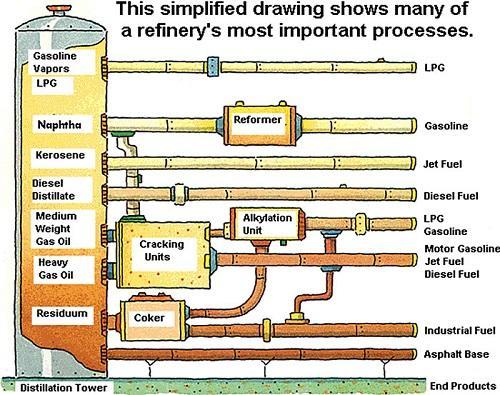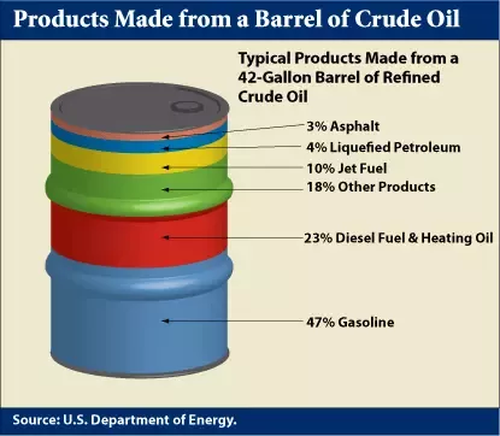One Little Problem With The “All-Electric” Auto Fleet: What Do We Do With All The “Waste” Gasoline?NOT A LOT OF PEOPLE KNOW THAT / by Paul Homewood / 23min
By Paul Homewood
I have written on this topic before, but Tyler Durden adds some more detail.
From Zero Hedge:
Back in the early days of the oil industry (1880s and 1890s), the product that the industry could sell at a profit was kerosene for lighting and heating. Since there was no automobile industry yet, gasoline was a waste product that was dumped into streams.
Why couldn’t the refiners produce only kerosene? Why did they end up with “worthless” gasoline?
The answer is a barrel of oil produces a variety of products. While there is some “wiggle room” to produce more diesel and less gasoline, etc., it isn’t possible to turn a barrel of oil into only one product.
John D. Rockefeller became very wealthy by cornering much of the oil market in the 19th century. But he didn’t become fabulously wealthy until the 20th century, when the rise of automobiles created a market for all the “waste” gasoline.
Rockefeller became super-wealthy when all the products of each barrel of oil could be sold at a premium rather than just a portion of the products.
This reality has been forgotten: the price that can be fetched for a barrel of oil depends on the demand for all the products, not just a few of the products.
Those demanding an all-electric auto-truck fleet as a “green” alternative will re-create the dilemma of what to do with the “waste” gasoline. The world will still want fuel for all those container ships bringing all the goodies of a consumerist society, all those cruise ships visiting ports of call, jet fuel for all those exotic vacations enabled by 550 mile-per-hour aircraft, and oil-based lubricants, plastics and petro-chemicals, and so oil will still be pumped and refined, and almost half of it will be gasoline.

We can either use it or throw it away but we can’t magically turn a barrel of oil into only one product.
This is a topic worthy of your understanding, so grab a vat of your favorite beverage and turn off all distractions.
Longtime readers know I’ve focused on energy-oil markets for 15 years. Despite ups and downs in price, the oil market has been remarkably stable.
This stability is about to transition to chronic instability: wild swings in price, shortages, and social chaos in both producing and consumer nations.
Let’s start with the most basic dynamics in the cost of producing oil, refining it and selling the products at a profit.
1. As a general rule, a barrel of oil (42 gallons, 196 liters) yields a range of heavier and lighter products.
The price the producers can charge for each product–gasoline, diesel fuel, heating oil, jet fuel, propane, etc.– depends on demand for each product.
If the price for one product falls drastically, the oil producer can’t increase the price of some other product to compensate for the loss of income unless demand for the other products will support higher prices.
Consider the huge decline in demand for jet fuel as a result of global air travel dropping in the pandemic. Oil producers can’t just raise the price of gasoline to compensate for the drop in the price of jet fuel.
If gasoline demand continues declining (due to fewer commutes, etc.) then producers can’t charge more for diesel to make up the drop in the price of gasoline.
In other words, there has to be strong demand for all the products in a barrel of oil for producers to get enough money to extract, refine and transport the products globally.
Unlike the old days when producers could afford to throw away some petroleum products because their costs of extraction and refining were so low, now producers need more than $45/barrel just to break even.

Durden rather loses the plot after this, focussing on debt mountains and the like.
The crucial issue, which I have highlighted, is that the world still needs oil, even if demand for petroleum and diesel is curtailed.
Oil refineries in the UK and elsewhere in the West will be faced with a situation where their economic viability is shattered by the loss of half their business. If they are to survive, that can only be on the back of huge price increases for the rest of their produce, which will of course in turn hit consumers hard.
But it is much more likely that oil refineries elsewhere in the world will simply take over the business, as they will be based in countries which have not turned their back on petroleum. Domestic based refiners won’t be able to compete against this.
Even then supplies of many oil based products are bound to be in short supply, by definition.
Meanwhile, oil producers will face wild swings in prices, as supply and demand adjust to the new global realities. This will inevitably lead to more economic dislocation.
Is it all worth it?SHAREVISIT WEBSITE


